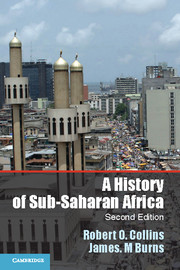Book contents
- Frontmatter
- Dedication
- Contents
- Acknowledgments
- Introduction
- Part I Foundations
- Part II Africa in World History
- Part III Imperial Africa
- 17 Upsetting the equilibrium
- 18 The European conquest of Africa
- 19 Southern Africa, 1486–1910
- 20 European colonial rule in Africa
- 21 The colonial legacy
- Part IV Independent Africa
- Index
- References
21 - The colonial legacy
Published online by Cambridge University Press: 05 June 2014
- Frontmatter
- Dedication
- Contents
- Acknowledgments
- Introduction
- Part I Foundations
- Part II Africa in World History
- Part III Imperial Africa
- 17 Upsetting the equilibrium
- 18 The European conquest of Africa
- 19 Southern Africa, 1486–1910
- 20 European colonial rule in Africa
- 21 The colonial legacy
- Part IV Independent Africa
- Index
- References
Summary
The colonial enterprise in Africa has been condemned as exploitative and praised as constructive. The West Indian scholar Walter Rodney asserted that European pressure distorted African economic growth and led to the underdevelopment of the continent. Rodney's critics counter that colonialism drew capital and investment into the continent that ultimately built an infrastructure that proved beneficial to the African peoples. At the beginning of the twenty-first century, controversy continues without respite, but there are two aspects of European colonialism in Africa on which the antagonists agree: European colonialism dramatically transformed Africa, and the Africans played a critical role in shaping the nature of colonialism and exposing its limitations.
The colonial experience in Africa can be roughly divided into two periods. At the end of the nineteenth century, the beginning of European colonialism was characterized by the imposition of imperial administrations accompanied by violent economic expropriation which imposed tremendous hardships on their African subjects. By the end of the First World War, most European states had indicated that the excessive abuse of Africans that had taken place during the preceding decades would no longer be tolerated, but during the interwar years, the British and French found it difficult to maintain coherent colonial policies. Their efforts were complicated by the world economic depression of the 1930s and then the Second World War, which found them allied with the anti-imperialist powers of the United States and the Soviet Union. To respond to the growing criticism of colonial rule, Britain in 1940 and France in 1946 launched programs for development that would mobilize African resources to restore their own economies but also provide employment and improved conditions for African wage laborers. When it became increasingly clear that these plans for economic revitalization drafted in London and Paris had failed to transform the colonial economic structure, European rulers were faced with the choice of either using massive force to suppress unrest or undertaking dramatic political reforms within their colonies. In most cases, the colonial powers determined that the latter option was the lesser of two evils.
- Type
- Chapter
- Information
- A History of Sub-Saharan Africa , pp. 308 - 328Publisher: Cambridge University PressPrint publication year: 2013

